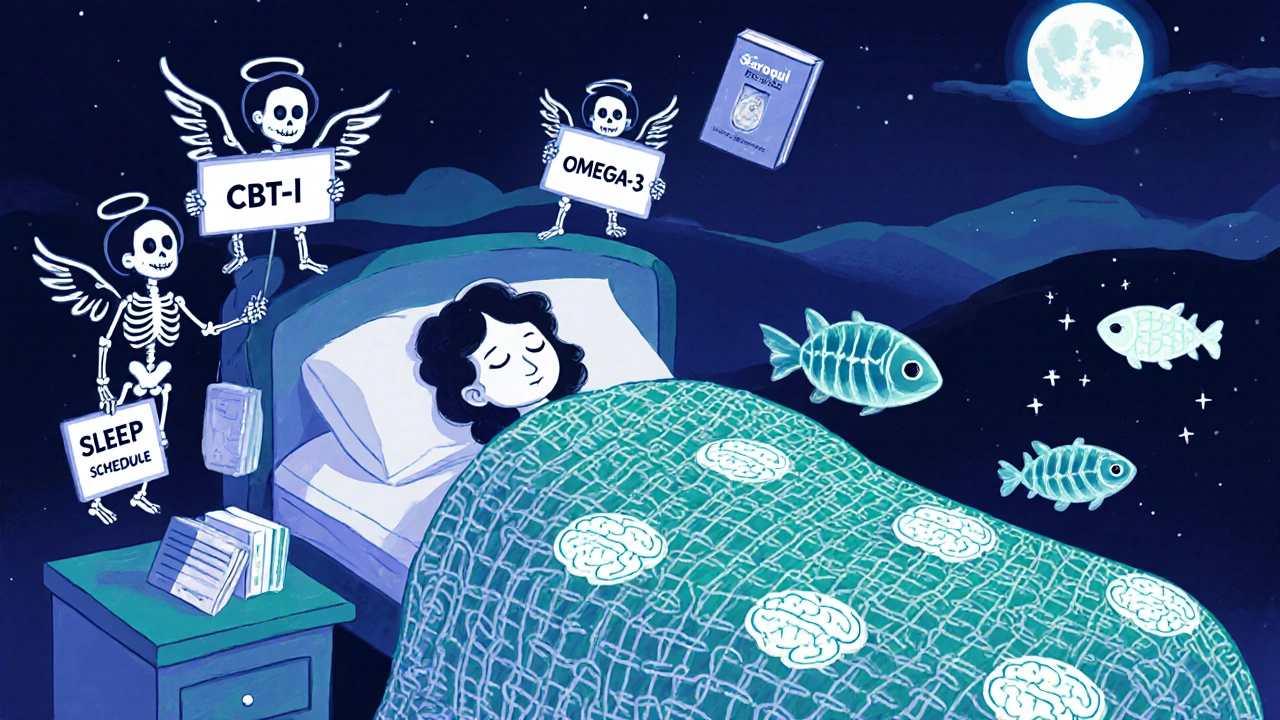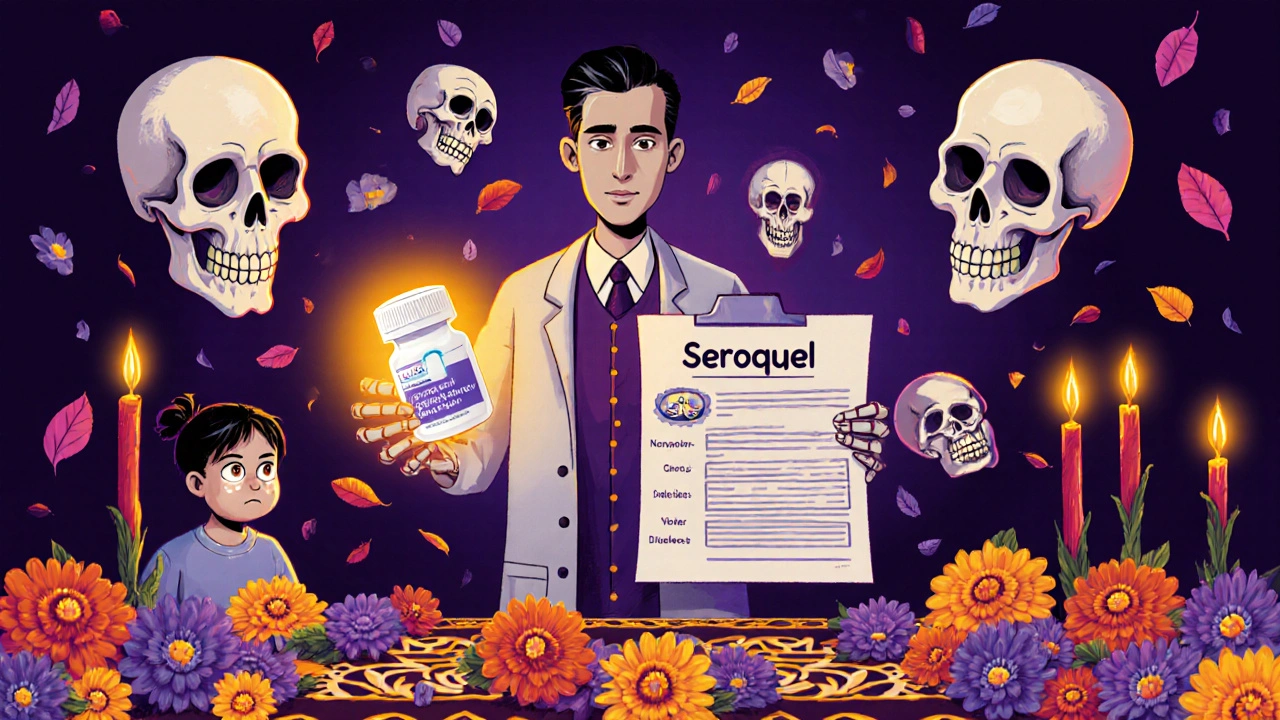Antipsychotic Medication Comparison Tool
Find the Best Alternative for You
Based on your primary condition and concerns, we'll compare medications from the article and show which options may work best for you.
Seroquel (quetiapine) is one of the most prescribed antipsychotic medications in the U.S., used for schizophrenia, bipolar disorder, and sometimes off-label for insomnia. But it’s not the only option-and for many people, it’s not the best. Side effects like weight gain, drowsiness, and metabolic changes make some patients seek alternatives. If you’re on Seroquel and wondering if there’s something better, or if you’re just starting treatment, here’s how quetiapine stacks up against other common medications.
How Seroquel Works and Who It’s For
Seroquel is an atypical antipsychotic that affects dopamine and serotonin receptors in the brain. It’s FDA-approved for:
- Schizophrenia in adults and teens 13+
- Bipolar I disorder (manic and depressive episodes)
- Bipolar depression (as monotherapy or with lithium/valproate)
- Major depressive disorder (in combination with antidepressants)
Doctors also prescribe it off-label for severe insomnia, especially when anxiety or mood instability is involved. But it’s not a sleep pill-it’s a brain modulator with wide-ranging effects.
Typical doses range from 50 mg to 800 mg daily, depending on the condition. The extended-release version (Seroquel XR) is often used for bipolar depression and maintenance therapy.
Common Side Effects of Seroquel
Before comparing alternatives, it’s important to know what you’re trying to avoid:
- Weight gain (average 5-10 lbs in first 12 weeks, sometimes much more)
- Increased blood sugar and risk of type 2 diabetes
- High cholesterol and triglycerides
- Drowsiness (up to 70% of users)
- Dizziness, dry mouth, constipation
- Metabolic syndrome in long-term users
A 2023 study in The American Journal of Psychiatry found that patients on quetiapine gained 2-3 times more weight than those on aripiprazole over 6 months. That’s not just inconvenient-it raises heart disease risk.
Alternative #1: Risperidone (Risperdal)
Risperidone is another atypical antipsychotic, often used for schizophrenia and irritability in autism. It’s been around longer than Seroquel and has a different side effect profile.
Pros:
- Less weight gain than quetiapine-most users gain under 3 lbs in 6 months
- Lower risk of metabolic issues
- Effective for acute psychosis and aggression
Cons:
- Higher risk of movement disorders (tremors, stiffness, restlessness)
- Can raise prolactin levels, leading to breast enlargement or missed periods
- Requires twice-daily dosing (unless using long-acting injection)
If you’re young, active, and worried about weight gain, risperidone might be a better fit. But if you have a history of movement disorders or Parkinson’s, it’s riskier.
Alternative #2: Olanzapine (Zyprexa)
Olanzapine is powerful and fast-acting, often used for acute manic episodes. It’s in the same class as Seroquel but packs a heavier metabolic punch.
Pros:
- Very effective for severe mania and psychosis
- Once-daily dosing
- Good for patients who struggle with adherence
Cons:
- Weight gain is worse than Seroquel-average 8-12 lbs in 12 weeks
- Higher risk of diabetes and high cholesterol
- Extreme drowsiness in many users
Olanzapine is a good choice if you need strong symptom control and don’t mind the side effects. But if you’re already overweight or have prediabetes, it’s not the best option.

Alternative #3: Aripiprazole (Abilify)
Aripiprazole is a partial dopamine agonist, which means it works differently than Seroquel. Instead of blocking dopamine, it balances it.
Pros:
- Minimal weight gain-most users gain less than 2 lbs
- No significant metabolic changes
- Lower risk of sedation
- Available as a monthly injection (Abilify Maintena)
Cons:
- Can cause restlessness or akathisia (inner agitation)
- Less effective for severe depression than Seroquel
- May trigger mania in some bipolar patients
Many patients switch from Seroquel to Abilify specifically to avoid weight gain. A 2024 real-world study from Kaiser Permanente showed that 68% of patients who switched from quetiapine to aripiprazole lost weight within 6 months. If your main issue with Seroquel is weight or metabolic health, this is the top alternative.
Alternative #4: Lurasidone (Latuda)
Lurasidone is newer and designed specifically for bipolar depression. It’s one of the few antipsychotics that doesn’t cause significant weight gain.
Pros:
- Very low risk of weight gain (less than 1 lb average)
- Doesn’t raise blood sugar or cholesterol
- Good for depressive episodes in bipolar disorder
- Minimal sedation
Cons:
- Must be taken with food (at least 350 calories) for absorption
- Can cause nausea or restlessness
- More expensive than older generics
- Not approved for schizophrenia or insomnia
If your main goal is treating bipolar depression without gaining weight, lurasidone is one of the best options available. But if you’re dealing with schizophrenia or need help sleeping, it won’t cover all your needs.
Alternative #5: Clozapine (Clozaril)
Clozapine is the most effective antipsychotic for treatment-resistant schizophrenia-but it’s not a first-line choice for a reason.
Pros:
- Most effective for patients who don’t respond to other drugs
- Reduces suicidal behavior in schizophrenia
- Lower risk of movement disorders
Cons:
- Requires weekly blood tests for agranulocytosis (dangerous drop in white blood cells)
- High risk of weight gain, diabetes, and seizures
- Severe sedation and drooling
Clozapine is a last-resort option. It’s not something you try unless other drugs have failed. But for those who’ve tried everything else, it can be life-changing.

Non-Drug Alternatives to Consider
Medication isn’t the only path. For bipolar disorder and insomnia, combining therapy with lifestyle changes can reduce reliance on drugs.
- Cognitive Behavioral Therapy for Insomnia (CBT-I) is more effective long-term than sleeping pills
- Interpersonal and Social Rhythm Therapy (IPSRT) helps stabilize mood in bipolar disorder
- Regular sleep schedule and light exposure reduce manic and depressive episodes
- Omega-3 supplements (EPA/DHA) show modest benefit in some bipolar studies
Many patients who use therapy alongside medication end up on lower doses-or even stop meds entirely under medical supervision.
Which Alternative Is Right for You?
There’s no one-size-fits-all answer. Here’s a quick guide:
| Medication | Best For | Weight Gain Risk | Sedation | Metabolic Risk | Dosing |
|---|---|---|---|---|---|
| Seroquel (quetiapine) | Schizophrenia, bipolar depression, insomnia | High | Very high | High | 1-2x daily |
| Risperidone | Psychosis, aggression | Low | Moderate | Low | 1-2x daily |
| Olanzapine | Acute mania | Very high | High | Very high | Once daily |
| Aripiprazole | Weight-sensitive patients, maintenance | Very low | Low | Very low | Once daily |
| Lurasidone | Bipolar depression | Very low | Low | Very low | Once daily (with food) |
| Clozapine | Treatment-resistant schizophrenia | High | Very high | High | 1-2x daily |
If you’re struggling with weight gain or fatigue, aripiprazole or lurasidone are your safest bets. If you need strong sedation for sleep and psychosis, Seroquel still has a place-but consider lowering the dose or combining it with CBT-I. If you’ve tried everything else and still have symptoms, clozapine is worth discussing with your psychiatrist.
What to Do Next
Don’t stop Seroquel on your own. Tapering too fast can cause rebound psychosis, insomnia, or nausea. Talk to your doctor about:
- Why you want to switch (side effects? lack of results?)
- What symptoms are most troubling
- Whether you’re treating psychosis, depression, or sleep
- Your weight, blood sugar, and cholesterol history
Many patients find that switching to a different antipsychotic takes 4-8 weeks to stabilize. Be patient. Track your symptoms and side effects in a journal. Bring it to your next appointment.
There’s no shame in trying something else. The goal isn’t to stay on the first drug you were given-it’s to feel better, live better, and stay healthy long-term.
Can you take Seroquel for sleep long-term?
Seroquel is sometimes prescribed off-label for insomnia, especially when anxiety or bipolar disorder is involved. But it’s not meant to be a long-term sleep aid. Over time, tolerance builds, side effects like weight gain and metabolic issues worsen, and the sedative effect may fade. For chronic insomnia, CBT-I is more effective and safer.
Is quetiapine better than lithium for bipolar disorder?
Lithium is a mood stabilizer and is often first-line for bipolar mania and prevention of episodes. Quetiapine works faster for acute depression and is better for mixed episodes. Many patients take both: lithium for long-term stability, quetiapine for depressive crashes. Neither is universally better-it depends on your symptoms and history.
Do Seroquel alternatives cause the same side effects?
All antipsychotics have side effects, but they differ. Seroquel and olanzapine are heavy on weight gain and metabolic issues. Aripiprazole and lurasidone are lighter on weight but can cause restlessness. Risperidone may cause movement problems. No drug is side-effect-free, but some are much safer for long-term use.
Can you switch from Seroquel to Abilify without withdrawal?
Switching requires careful planning. Abruptly stopping Seroquel can cause insomnia, nausea, or rebound psychosis. Your doctor will likely reduce your dose slowly over 2-4 weeks while gradually introducing aripiprazole. Blood levels and symptoms are monitored closely during the transition.
Are there natural supplements that work like Seroquel?
No supplement replaces antipsychotic medication for schizophrenia or bipolar disorder. Some, like omega-3s, magnesium, or NAC (N-acetylcysteine), may help reduce symptoms slightly when used with medication-but they don’t control psychosis or severe mood swings on their own. Never stop your prescribed meds for supplements without medical supervision.
Final Thoughts
Seroquel is a useful tool, but it’s not the only one-and it’s not always the best. If you’re tired of gaining weight, feeling sluggish, or worrying about your blood sugar, there are better options. Aripiprazole and lurasidone offer strong symptom control with far fewer metabolic risks. Risperidone is a solid middle ground. And if you’ve tried everything else, clozapine remains the most powerful option.
What matters most isn’t which drug is ‘strongest’-it’s which one helps you live your life without dragging you down. Talk to your doctor. Track your progress. And remember: you have the right to ask for something that works better for you.








13 Comments
Rohit Nair October 27, 2025
Been on quetiapine for 3 years, switched to aripiprazole last year. Lost 22 lbs, no more brain fog, and I actually wake up without wanting to crawl back under the covers. Not saying it’s perfect-got a little restless, but way better than feeling like a zombie in my own skin. If you’re struggling with weight, just talk to your doc. It’s not a failure, it’s a fix.
Wendy Stanford October 29, 2025
It’s fascinating how we’ve turned the human nervous system into a chemical balancing act governed by pharmaceutical corporations who profit from our biological instability. We’ve replaced existential inquiry with pharmacological compliance, and now we debate which antidepressant causes the least weight gain as if that’s the pinnacle of human progress. What happened to therapy? To community? To simply being allowed to feel without being medicated into neutrality?
Jessica Glass October 30, 2025
Oh wow, so we’re now treating insomnia with antipsychotics like it’s a spa day? Next they’ll prescribe lithium for bad breakups and clozapine for Monday blues. At least tell people the truth-it’s not medicine, it’s chemical sedation with a side of diabetes. And don’t get me started on the ‘off-label’ loophole. That’s not medicine, that’s medical malpractice with a prescription pad.
Krishna Kranthi October 31, 2025
Man I been through all this, from Seroquel to Abilify to Latuda, and honestly the real game changer? My yoga teacher. Not the meds, the breathing. I mean yeah, the pills kept me from screaming at the moon but the morning sun on my mat? That kept me from losing my soul. Also, lurasidone tastes like chalk and you gotta eat a whole damn sandwich with it? Who designed this? My grandma’s biryani is more reliable than this drug schedule
Lilly Dillon October 31, 2025
I switched to lurasidone and it’s been life-changing. No weight gain, no drowsiness, and I can actually go for walks again. The food requirement is annoying but worth it. I keep a protein bar in my bag just in case. Small price to pay for feeling human.
Shiv Sivaguru November 1, 2025
Why are we even talking about this? Everyone knows the real answer is just to stop taking the damn pills and go live in the woods. I did it. No meds. No therapy. Just a tent, a guitar, and a lot of silence. My ‘psychosis’ turned into peace. They call it mental illness, I call it society being too loud. Try unplugging for a year. You’ll thank me later. Or not. I don’t care. I’m already zen.
Gavin McMurdo November 2, 2025
Let’s be real: the entire psychiatric pharmaceutical model is a Ponzi scheme disguised as science. Seroquel? Olanzapine? They’re not treatments-they’re corporate sedatives designed to keep people docile while the economy collapses. And now we’re debating which one gives you the least diabetes? Pathetic. The real alternative? A society that doesn’t break people in the first place. But no, let’s keep prescribing pills instead of paying rent, fixing schools, and ending wage slavery.
Jesse Weinberger November 2, 2025
Everyone’s talking about Abilify like it’s magic, but did you know it can make you compulsively gamble? My cousin lost his house on slot machines after switching. They don’t tell you that on the pamphlet. And CBT-I? That’s just a fancy way of saying ‘try harder to sleep.’ Meanwhile, my doctor just shrugs and says ‘try another pill.’ We’re all lab rats in a system that doesn’t care if we live or die, just as long as we keep buying.
Emilie Bronsard November 3, 2025
Thank you for this. I’ve been terrified to switch from Seroquel because I thought I’d lose my stability. But reading about others who switched to aripiprazole gave me hope. I’m scheduling an appointment next week. I’m not giving up on meds-I’m just giving myself a better chance.
John Bob November 3, 2025
Who funded this article? Pharma? The FDA? The American Psychiatric Association? Because the data is cherry-picked. Aripiprazole’s akathisia is underreported. Lurasidone’s efficacy is only proven in short-term trials. And clozapine? They hide the mortality rate. This isn’t medicine-it’s propaganda with footnotes.
Alex Grizzell November 5, 2025
You got this 💪 Seriously, switching meds is scary but you’re not alone. I went from Seroquel to Latuda and it felt like waking up after a 10-year nap. Yes, I had to eat a big lunch every time-felt like a toddler-but I got my energy back. And yeah, I cried a lot in the first week. But now I’m hiking, cooking, and even dating again. Don’t give up. Your brain deserves better than feeling like a sack of wet concrete.
George Johnson November 6, 2025
They all suck. Just take the damn Seroquel and stop whining. At least you’re not screaming at the walls. I’ve tried the alternatives. They either make you jittery or make you want to quit life. Seroquel’s a bummer but it’s a bummer that works. Call it a trade-off. Life’s full of them.
Rodrigo Ferguson November 7, 2025
One must interrogate the epistemological foundations of pharmacological intervention in the phenomenology of subjective experience. The reduction of complex affective states to receptor affinities constitutes a reification of consciousness that is both scientistic and ontologically bankrupt. One is compelled to ask: if the self is merely a constellation of neurochemical imbalances, then what becomes of agency? Of meaning? Of the soul? The very language of 'alternatives' presupposes a medical model that has long since ceased to be a heuristic and has instead become a totalitarian orthodoxy.